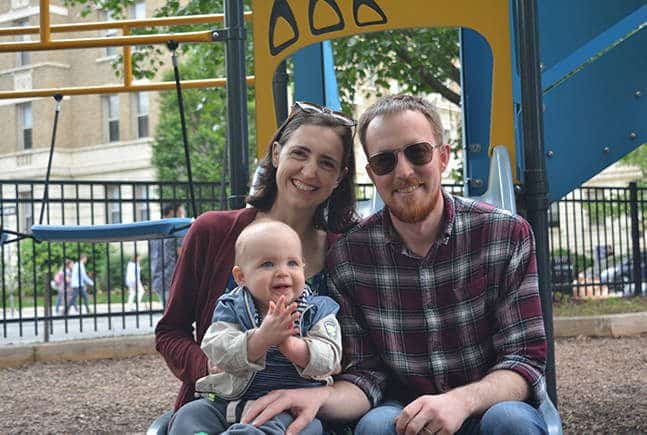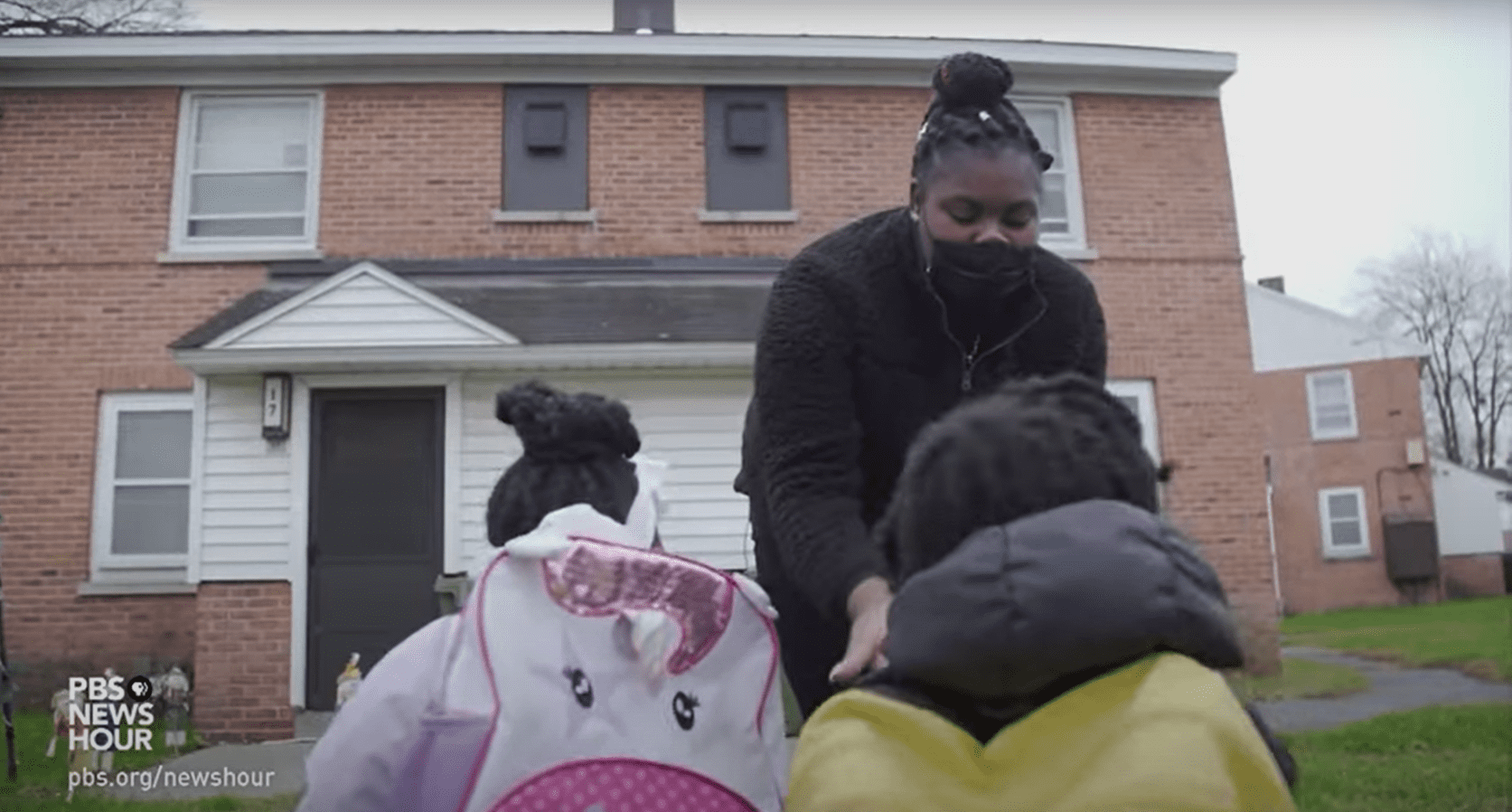Our son, Ronen, turned a year old last month. He has just enough hair that it fluffs up in the back on nights when he rubs his dinner all over his head, which—let’s face it—is most nights now. He loves opening and closing things in our apartment: cabinets, containers, doors, drawers, boxes, whatever we let him reach. He loathes getting dressed. On meeting someone in the elevator, he is equally likely to smile at them or stare, open-mouthed, with such unblinking focus that I always feel the need to apologize. (It feels like high stakes for something as simple as going downstairs.)
In short, Ronen is growing into a busy, curious, wiggly little boy. He’s basically walking, and he has mastered enough consonants that words won’t be far behind. When I look at him, it’s hard to see the helpless baby we met just over a year ago. But he isn’t the only one who’s changed. I think back to where I was last May—having never changed a diaper, never mixed formula, never struggled to fasten a onesie while its occupant squirmed and hollered as though to summon a more experienced dad to help us. (To no avail—sorry, Ro.) When I think about how much I’ve learned since he was born, I’m amazed that I’ve only been a father for 400 days.
I’m barely out of my first inning as a parent, so I hardly feel qualified to coach anyone. But thinking back on the past year, there are definitely some things I wish I had known before Ronen came, or picked up faster once he arrived. It’s in that spirit that I share five pieces of advice for new and expecting dads (and parents in general).
#1: Stockpile information ahead of time (as much as you can, anyway).
 After your baby comes, you may find yourself awake at 2 a.m. (or 3 … or 4), rocking her in one arm while scrolling through a mind-blurring succession of web pages about infant sleep. (I suggest you bookmark this one now, just in case.)
After your baby comes, you may find yourself awake at 2 a.m. (or 3 … or 4), rocking her in one arm while scrolling through a mind-blurring succession of web pages about infant sleep. (I suggest you bookmark this one now, just in case.)
To an extent, this is inevitable. You can’t predict every challenge. And all babies are different, so what bedevils one will prove far easier for another. But when it comes to the broad strokes (sleeping, eating, crawling, talking), I wish I had done more cramming for the test before the day came—bought or borrowed more books, read more articles, taken more notes. I’ve rarely been so relieved as when we face some new problem, and I remember that we had the foresight to add a book on the subject to our shelf before Ronen came, even if we only skimmed it at the time.
Of course, just having the information at hand is only the first step. I remember sitting in our apartment with my wife, Sammy, and my dad shortly after Ronen came. Each of us had a different book on babies and sleep. We were thumbing through them and calling out helpful passages, many of which were contradicted by equally helpful passages from the other books. At this point, I can’t remember exactly what we tried. But now Ronen sleeps through the night. May that be the end result for you, too, whatever your research process.
#2: Other parents are a great resource. Connect with them.
Once we learned we were expecting, I knew other parents would be helpful sources of wisdom. But I didn’t understand just how much. We’ve gotten some of our best recommendations and insights from fellow parents, whether they’re friends or just people we fall into conversation with on the playground.
Other parents can tell you how they solved early challenges. (A close friend of ours had a yoga ball she would bounce on while holding her infant daughter to soothe her when nothing else would work. She gave us the ball when Ronen was born. It worked like a charm, and boy did we need it!) Other parents can share recommendations for teethers, cribs, books (for new parents and new babies alike), strollers, swaddles, and so on.
They can also offer a general spirit of support and solidarity. Early after Ronen was born, I especially enjoyed interacting with parents who had older kids. Sure, they often shared good advice, but it was also validating just to look at them and imagine Future Dad Will appearing (and feeling) similarly confident in parenting, not to mention as well-rested.
#3: You will get comfortable—and good at—changing diapers.
Even faster than you think.
#4: Be ready to improvise.

Things don’t always go according to plan. Maybe the onesie you put on your baby before you left the house has an unfortunate encounter with spit-up (or something more noxious). Maybe none of the new finger foods you picked up for your toddler to try are a hit at dinner, leaving you sprinting to the refrigerator.
I try to plan ahead as much as I can, especially in the mornings, when I get Ronen ready for the day and take him to child care. But plans fall through, and sometimes even backup plans collapse. One thing I try to cultivate is a readiness to improvise—to try, in the face of the unexpected, anything and everything, even if it has only just occurred to me.
Some of my last-ditch solutions have even graduated into favorite activities. The last 10 minutes of our morning routine used to be an unhappy time for Ronen. I would set him in his playpen so I could get dressed and pack his bottles and lunch. Wanting to join me in these activities, he would get more and more worked up until he was wailing. We tried toys, music, and other distractions. No success.
One morning—spontaneously, in an effort to distract him—I made up a game. I would try to bounce a rubber ball into his crib, and when I did it, I would cheer like my team had just won the big game. This proved such a hit (I think it’s the cheering) that we do it most mornings now, and those 10 minutes are much easier. Sure, I’m still tugging on my socks and ransacking the fridge for bottles in between rounds. But it does the trick, and it’s also become one of my favorite parts of the day.
#5: Try to remember that many of today’s challenges will be tomorrow’s stories.
Some of the memories my parents relate about my childhood most frequently, in no particular order:
- The time, at a few years old, I broke my collarbone playing duck, duck, goose. (Don’t ask.)
- The time I was staying at my grandparents’, vanished one morning, and was thought to be lost, spurring a panicked search. (I was soon found under the bed. I had fallen out, rolled beneath it, and fallen back asleep.)
- The time a lizard bit my finger the day before we left for a family vacation, prompting a call to poison control and contemplations of canceling the trip.
These aren’t warm recollections of lazy afternoons. They’re adventure stories that feature injury and temporary disappearance, more Hansel and Gretel than Piglet and Pooh. And I’m not alone. When I hear childhood stories shared among friends or at family gatherings, it’s the scrapes and sprees that invariably surface: broken bones, escaped pets, and so on.
Small disasters, once resolved, often have a way of writing themselves into family lore. Overcoming them becomes an occasion to celebrate the journey itself. So, when Ronen is cheerfully chirping at us to come and play at 4 in the morning; or he won’t touch any food on his tray; or we’re cradling him in the midst of a fuss, or a fall, or a low-grade fever; I try to remind myself that it’s fine, it’ll be okay, and to think of how distant it will feel some Thanksgiving in the future, next year or in a decade to come. I remind myself that we might chuckle about it, if we even remember by then.
Sometimes, if only for a moment, it even works.


